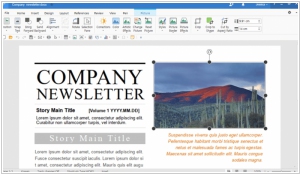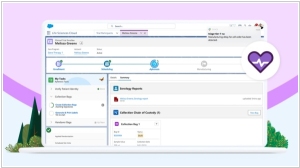LibreOffice vs Polaris Office
September 26, 2023 | Author: Adam Levine
14
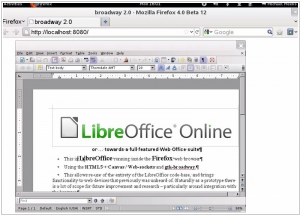
LibreOffice is the power-packed free, libre and open source personal productivity suite for Windows, Macintosh and GNU/Linux, that gives you six feature-rich applications for all your document production and data processing needs: Writer, Calc, Impress, Draw, Math and Base. Support and documentation is free from our large, dedicated community of users, contributors and developers. The online and mobile version (for Android and iPad) are coming soon
LibreOffice and Polaris Office are both popular office productivity suites, but they have distinct differences in terms of features and user experience. LibreOffice is an open-source suite that offers a comprehensive set of applications, including a word processor, spreadsheet software, presentation software, and more. It provides a wide range of features and compatibility with various document formats. LibreOffice is highly customizable and supports extensions, making it suitable for users who value flexibility and open-source software. On the other hand, Polaris Office is a cloud-based suite that offers similar applications for document creation, editing, and collaboration. It provides a user-friendly interface and seamless integration with cloud storage, enabling users to access their files across devices. Polaris Office focuses on ease of use and real-time collaboration, making it suitable for users who prefer a streamlined and cloud-centric workflow.
See also: Top 10 Office suites
See also: Top 10 Office suites
LibreOffice vs Polaris Office in our news:
2022. LibreOffice begins charging Mac App Store users $8.99
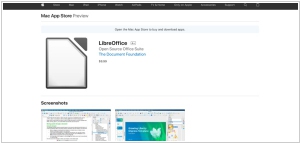
The well-known open-source document processing suite, LibreOffice, has introduced a new approach by charging users a one-time fee of $8.99 when downloading the software through the Mac App Store. This move comes as a surprise from The Document Foundation (TDF), the organization responsible for LibreOffice, as all previous versions of the suite were freely available. Italo Vignoli, head of marketing and public relations at LibreOffice, stated that this change reflects a "new marketing strategy." TDF will primarily focus on releasing free community versions of LibreOffice, while "ecosystem companies" will develop "value-added" versions specifically aimed at enterprise customers. The LibreOffice client available on the Mac App Store falls into the latter category since it is not based on the same source code as the core LibreOffice project.
2017. LibreOffice released in-house web version with collaborative online editing

The latest version of the open-source office suite, LibreOffice 5.3, has been released by the Document Foundation. This update introduces several new features, including a ribbon interface that bears resemblance to Microsoft Office. Additionally, the foundation has made the LibreOffice Online source code available for installation on servers. The foundation explicitly stated that it does not possess the resources or intention to establish an online service akin to Google Docs or Office 365. Instead, it provides the LibreOffice Online code, allowing users to install it on their own servers. To utilize this functionality, users require a single sign-on service and a file synchronization and storage solution such as Nextcloud. Once installed, users can collaborate on documents by adding users and initiating collaboration. While LibreOffice Online can be installed by individuals on their own servers, it primarily targets ISPs and other cloud providers, empowering them to offer open-source online collaborative suites as competitors to Google Docs and Office 365.
2015. LibreOffice 5.0 includes mobile editor for Android
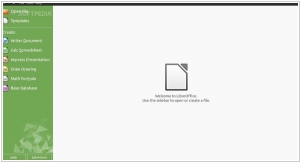
LibreOffice has recently undergone a significant update with the introduction of version 5.0, and its developers assert that it will pose a formidable challenge to other productivity suites in the market. Notably, this release utilizes the same source code for the desktop, Android, and cloud versions, ensuring that users across all platforms can enjoy a similar array of features. The latest version also boasts an improved interface, enhanced screen space management, and superior compatibility with other office suites such as Microsoft Office and Apple iWork. Additionally, efforts have been made to enable virtualization solutions for integrating LibreOffice with Chrome OS and iOS, although these solutions are not yet fully optimized for mobile devices. Moreover, an online version of LibreOffice is expected to become available either late this year or early in 2016. Version 5.0 encompasses mobile clients for Android and Ubuntu Touch (the mobile version of the Ubuntu operating system), introduces new icons, refines menus and sidebars, enhances document import and export filters, and ensures heightened fidelity in document conversion.
2013. New collaboration tools in ONLYOFFICE and LibreOffice
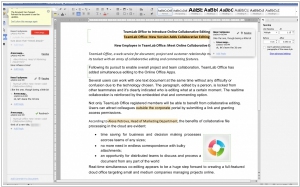
Microsoft recently launched the new Office 2013 and as usual with the release of new version there is a number of frustrated users that consider switching to competing products. So now is the best time for Microsoft rivals to push their office-suites. TeamLab (that recently became an "Office") added real-time collaboration feature. Now you can see who is working on a document at the moment, which paragraph he is editing and communicate with co-workers in comments and chat. You can even invite for co-editing users that are not registered in TeamLab. So TeamLab is now like Google Apps - they even set the same price $50/year. Only in Google Apps it's the price for 1 user, while in TeamLab - for 5 users. By the way, TeamLab's pricing is changed again: there is single edition and no free version. ***
2011. LibreOffice is going to the Cloud, iPad and Android
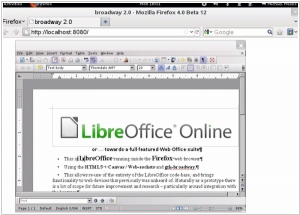
LibreOffice - is a fork of the open-source project OpenOffice, which was founded after Sun acquisition by Oracle last year. The development team, which stands behind the LibreOffice calls itself the Document Foundation and aims to develop a free and open-source alternative to commercial office suites. Google and Red Hat are also involved in the development of LibreOffice. So, this LibreOffice is quite serious in its plans and is going not only inherit the glory and the user base of the OpenOffice, but also step on the Microsoft's tail. This week, the Document Foundation announced that in 2012 it will launch the online version - LibreOffice Online, which will work on HTML5, as well as mobile versions of the office suite for iPad and Android tablets. ***

